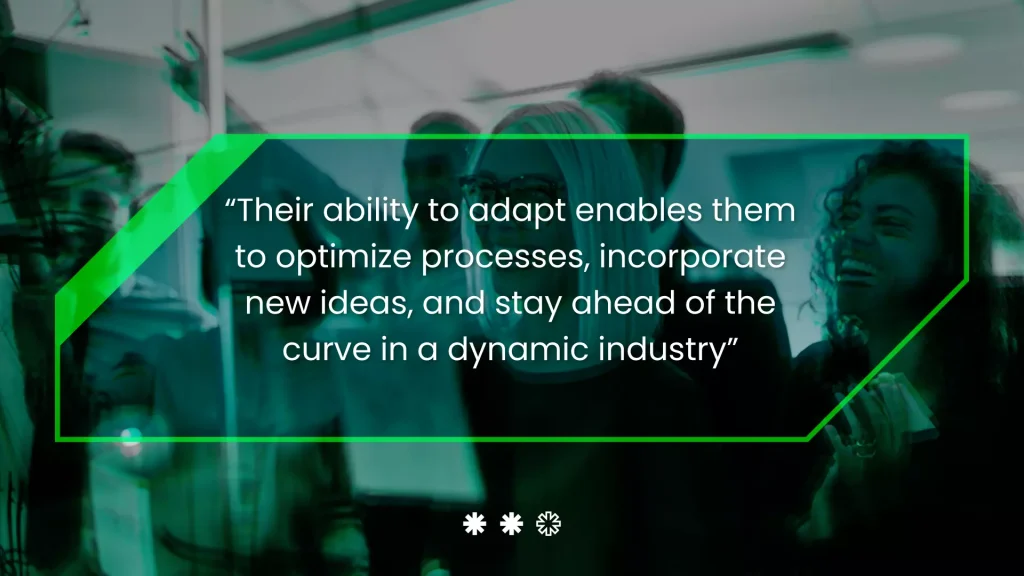Discover the qualities of top-performing agile software development teams. Expert insights on building high-performing teams that make the difference in any tech project.
10 Qualities of High-performing Teams
Are you looking to outsource a software project? Wondering what sets high-performing teams apart in the realm of agile software development? Look no further! In this blog post, we delve into the top 10 qualities that make agile teams excel, providing expert insights on building the ultimate powerhouse of software developers. Gain valuable knowledge on the essential skills and traits that drive success in the fast-paced world of agile software development.
You may also be interested in: Why businesses choose Colombian software developers in Latin America
Effective Communication for Efficient Teams
In the realm of agile software development, effective communication stands as a cornerstone for achieving high performance. A team’s ability to maintain open, transparent, and concise communication is vital for seamless collaboration, idea exchange, and addressing concerns. By fostering a culture of clear and timely communication, team members can align their efforts, share knowledge, and ensure that everyone is on the same page. Effective communication helps prevent misunderstandings, boosts productivity, and facilitates efficient decision-making, ultimately leading to the success of agile projects.

Diverse Skill Sets: The Power of Versatility in Agile Teams
In agile software development, high-performing teams thrive on diversity. Each team member brings a unique set of skills and capabilities to the table, enabling them to contribute to different facets of the project. This diversity fosters a cooperative and adaptable environment where individuals can learn from one another, leveraging their strengths to overcome challenges. By having a diverse range of skill sets, teams can tackle various tasks efficiently and embrace cross-functional collaboration. This versatility not only enhances problem-solving but also encourages continuous learning, enabling teams to stay agile and deliver exceptional results.

Agility and Adaptability: Thriving in a Changing Landscape
Top-performing teams excel in their agility and adaptability. They embrace change, swiftly adjust to new requirements, and utilize feedback as a catalyst for continuous product improvement. By staying flexible and responsive, these teams can navigate evolving landscapes and deliver value to stakeholders efficiently. Their ability to adapt enables them to optimize processes, incorporate new ideas, and stay ahead of the curve in a dynamic industry. In mastering agility and adaptability, high-performing teams establish themselves as champions of innovation and success.

Trust Is the Foundation for High-performing Teams
Trust forms the bedrock of high-performing agile software development teams. By fostering a secure atmosphere, team members feel comfortable taking risks, sharing ideas, and acknowledging mistakes. Trust empowers individuals to collaborate openly, knowing their contributions are valued. It cultivates psychological safety, encouraging creativity and innovation. When trust is established, teams thrive, building strong relationships, fostering accountability, and achieving remarkable results. By prioritizing trust, high-performing teams create a supportive environment where individuals can flourish, driving success in agile software development.

Successful Teams Self-Manage
In mastering agile software development, efficient teams can self-manage . They possess the autonomy to organize themselves and make decisions without relying on excessive oversight. This empowerment fosters a sense of ownership, accountability, and efficiency. Self-managing teams excel in setting priorities, distributing tasks, and adapting to changing requirements. With minimal intervention, they harness their collective expertise to deliver exceptional results. By cultivating self-management, agile teams unlock their full potential, driving innovation, collaboration, and continuous improvement in their pursuit of excellence.

Customer-centric Approach: the Key to Agile Success
Successful teams adopt a customer-centric approach. They prioritize the customer’s needs, engaging with them to ensure the product aligns with their expectations. By actively involving customers throughout the development process, these teams gather valuable feedback, validate assumptions, and deliver solutions that truly address customer requirements. This customer-centric mindset drives innovation, fosters strong relationships, and ultimately leads to the successful delivery of products that delight and fulfill the needs of the end-users.

Technical Proficiency: Elevating Agile Software Delivery
Superior agile teams excel in technical proficiency, upholding rigorous standards of expertise. They strive for exceptional software delivery through practices like code reviews, automated testing, and continuous integration. By prioritizing quality and embracing best practices, these teams ensure robust and reliable solutions. Their technical acumen enables them to mitigate risks, optimize performance, and deliver software that meets or exceeds industry standards. With a strong foundation of technical proficiency, high-performing agile teams consistently deliver outstanding results, earning the trust and satisfaction of stakeholders.

Collaborative Spirit and Teamwork: The Foundation of Best-in-Class Teams
High-performing agile teams exhibit a collaborative spirit and thrive on teamwork. They embrace cooperation and mutual support, valuing each member’s strengths and weaknesses. By working towards shared objectives, they foster a culture of respect and synergy. Collaboration enables them to leverage diverse perspectives, share knowledge, and solve complex problems together. This collective effort leads to increased innovation, efficiency, and ultimately, the successful delivery of high-quality software. A strong collaborative spirit is the foundation upon which high-performing teams build their success in agile software development.

Adherence to Agile Principles
High-performance software development teams understand and embrace the Agile manifesto and its principles. They use these principles as a guiding framework for daily tasks and decision-making processes. By valuing individuals and team interactions, customer collaboration, and responding to change, these teams create a foundation for success. Adhering to agile principles fosters adaptability, customer-centricity, and continuous improvement. It ensures that the team remains aligned with agile values, enabling them to deliver exceptional results and maximize the benefits of agile methodologies.

Bonus: Three Qualities for Globally Distributed Teams
In today’s fast-paced and interconnected world, organizations are increasingly turning to globally distributed teams to deliver software and drive innovation. The ability to collaborate seamlessly across geographical boundaries and time zones has become a critical factor in the success of agile software development teams and projects. However, managing distributed teams comes with its own unique set of challenges. To excel in this environment, outstanding teams must possess certain qualities that enable them to overcome these obstacles and deliver exceptional results.
You may also be interested in: The benefits of outsourcing: What industries outsource the most?
Cultural Awareness:
They understand and respect diverse cultural backgrounds, fostering strong relationships and effective collaboration across cultures.
Time Zone Flexibility:
They adapt schedules, plan meetings, and manage communication delays to navigate time zone challenges.
Collaboration Tool Proficiency:
They leverage technology for seamless communication and collaboration, using various tools and establishing clear guidelines.
Stay tuned for more insights on other qualities that define high-performing, distributed agile teams in our upcoming blog series.
Discover more about our outsourced teams by clicking here.
You may also be interested in:
What are AI agents and AutoGPT and how will they transform business?
Prompt engineering is key to the AI and machine learning revolution








